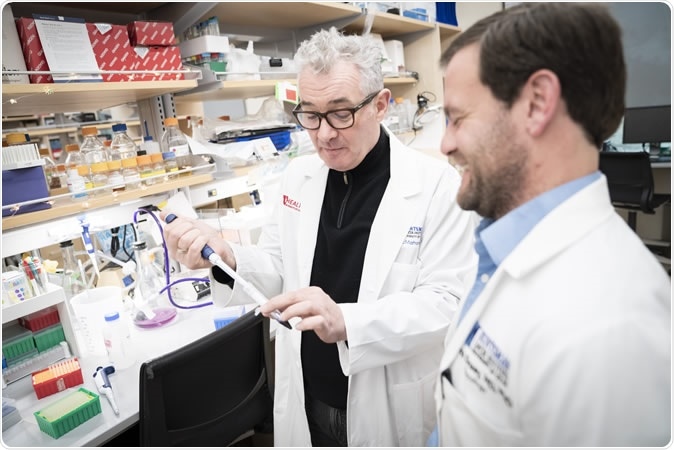One-year survival is low among patients diagnosed with pancreatic cancer. Researchers from Huntsman Cancer Institute (HCI) at the University of Utah have now come up with a potential new therapy for pancreatic cancer patients.

Martin McMahon, PhD (left) and Conan Kinsey, MD (right)
The researchers have found that a new combination therapeutic approach can effectively fight the disease and prolong survival among patients. The therapy has shown promise in the laboratory set up and now is ready for use among human patients in its clinical trials. The results of the study were published in the latest issue of the journal Nature Medicine.
The team has opened up the therapy for clinical trials at HCI as well as other centres across United States along with support from University of California, San Francisco, and Columbia University in New York. The trial is named the THREAD trial and the details are available at National Clinical Trial Number 03825289. The therapy would use a combination of two FDA (Food and Drug Administration) approved drugs that are currently being used for other types of cancer – namely trametinib and hydroxychloroquine. This therapy is oral and the drugs would be administered in the form of a pill. Eligible patients would be those who are diagnosed with “Metastatic Pancreatic Carcinoma Stage II, Pancreatic Cancer Stage IIA, Pancreatic Cancer Stage IIB, Pancreatic Cancer Stage III, Pancreatic Cancer Stage IV and Pancreatic Cancer Unresectable Pancreatic Carcinoma.”
The researchers explain that pancreatic cancers are mainly due to a genetic mutation called the KRAS mutation. Mutation of KRAS leads to signals that promote abnormal cell growth in the cancer cells. Each cell has an important function call autophagy that keeps abnormal growth in check. Pancreatic cancer treatment deals with either KRAS mutation or autophagy. Neither of these approaches have been found to be useful or effective.
In this new approach the targets are not only KRAS but also the process of autophagy. The study was led by Drs Conan Kinsey, physician-scientist at HCI and Martin McMahon, cancer researcher at HCI and Professor of Dermatology at the University of Utah.
McMahon said, “We were able to observe that the combination of these two drugs – which, when used individually, don’t have much of an impact on the disease – appears to have a very potent impact on the growth of pancreatic cancer. We have observed this in the lab in petri dishes, then in mouse models, and now in a pancreatic cancer patient on a compassionate use basis. Indeed, we proceeded from a petri dish to a patient in less than two years – a timeline that is rarely seen in medical science.”
Yet another study was published in the same issue of the journal. This study too looked at the effects of modulating autophagy on pancreatic cancer. This study was conducted under the leadership of Drs Channing Der, Sarah Graham Kenan and Kirsten Bryant from the University of North Carolina (UNC) Lineberger Comprehensive Cancer Center.
Kinsey from the first study said in a statement, “In our paper, we show the response of a pancreatic cancer patient who had received surgery and multiple lines of chemotherapy prior to this combination. This patient, who has since succumbed to the disease, nevertheless had a remarkable response to these drugs for several months. We need to carefully evaluate this new combination therapy in the context of clinical trials to better understand if good responses might be seen in multiple patients. We also need to identify the specific features of any patient who may benefit, before any recommendation can be made about use on a larger scale.” This study received support from the National Cancer Institute.